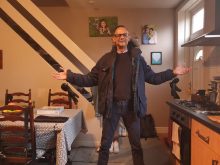 ‘Recovery Rising is the professional memoirs of William (Bill) L White who, over the span of five decades, evolved through several diverse roles to emerge as the addiction fields preeminent historian and one of its most visionary voices and prolific writers.’
‘Recovery Rising is the professional memoirs of William (Bill) L White who, over the span of five decades, evolved through several diverse roles to emerge as the addiction fields preeminent historian and one of its most visionary voices and prolific writers.’
The contains so many pearls of wisdom, and is an essential read for anyone interested in addiction recovery. Here are a few pearls, including a verylarge one. [NB. I have broken up Bill’s longest paragraph to make it easier to read online.]
‘The most obvious gifts of knowledge that recovering people can bestow on our communities are our stories—stories that unveil the experience of addiction, stories that communicate the reality and hope of full recovery, and stories detailing how such recovery can be initiated and sustained. Five ideas about recovery need to be inculcated within communities across America.
- Addiction recovery is a reality—it is everywhere.
- There are many paths to recovery.
- Recovery flourishes in supportive communities.
- Recovery is a voluntary process.
- Recovering and recovered people are part of the solution; recovery gives back what addiction has taken.

 I just wanted to remind you about our
I just wanted to remind you about our  Here is some powerful writing from Theresa, who started blogging about her recovery on our online community Wired In To Recovery in May, 2010. Here are her first two posts:
Here is some powerful writing from Theresa, who started blogging about her recovery on our online community Wired In To Recovery in May, 2010. Here are her first two posts: Huseyin Djemil of
Huseyin Djemil of  Here is a blog that I first posted on the website in September 2013. Rosie had earlier posted the blog on our online community Wired In To Recovery.
Here is a blog that I first posted on the website in September 2013. Rosie had earlier posted the blog on our online community Wired In To Recovery. Yesterday, I posted
Yesterday, I posted  Here’s one of my favourite posts from that prolific blogger William (Bill) White, addiction recovery advocate, writer, researcher and historian. Bill’s complete writings are now being hosted on a
Here’s one of my favourite posts from that prolific blogger William (Bill) White, addiction recovery advocate, writer, researcher and historian. Bill’s complete writings are now being hosted on a  Huseyin Djemil
Huseyin Djemil

 One of my favourite bloggers has been Phil Valentine, Executive Director of the
One of my favourite bloggers has been Phil Valentine, Executive Director of the  Here is another
Here is another  I first posted this blog about Kevin Kennedy’s book about his recovery on Christmas Day, 2013. It was taken from an article from the now defunct Addiction Today. Kevin will be 25 years in recovery this October!
I first posted this blog about Kevin Kennedy’s book about his recovery on Christmas Day, 2013. It was taken from an article from the now defunct Addiction Today. Kevin will be 25 years in recovery this October!
